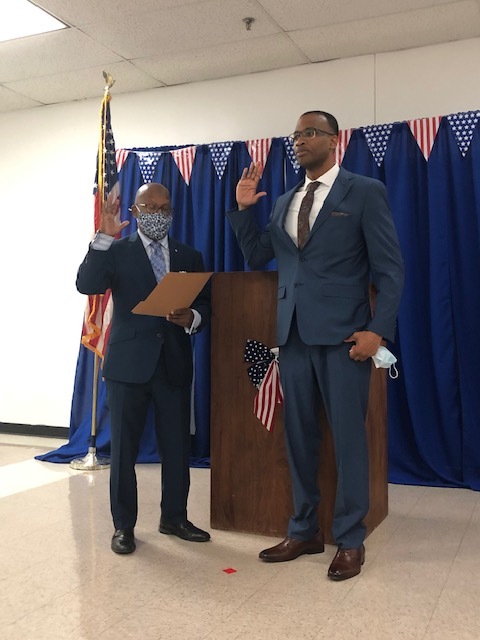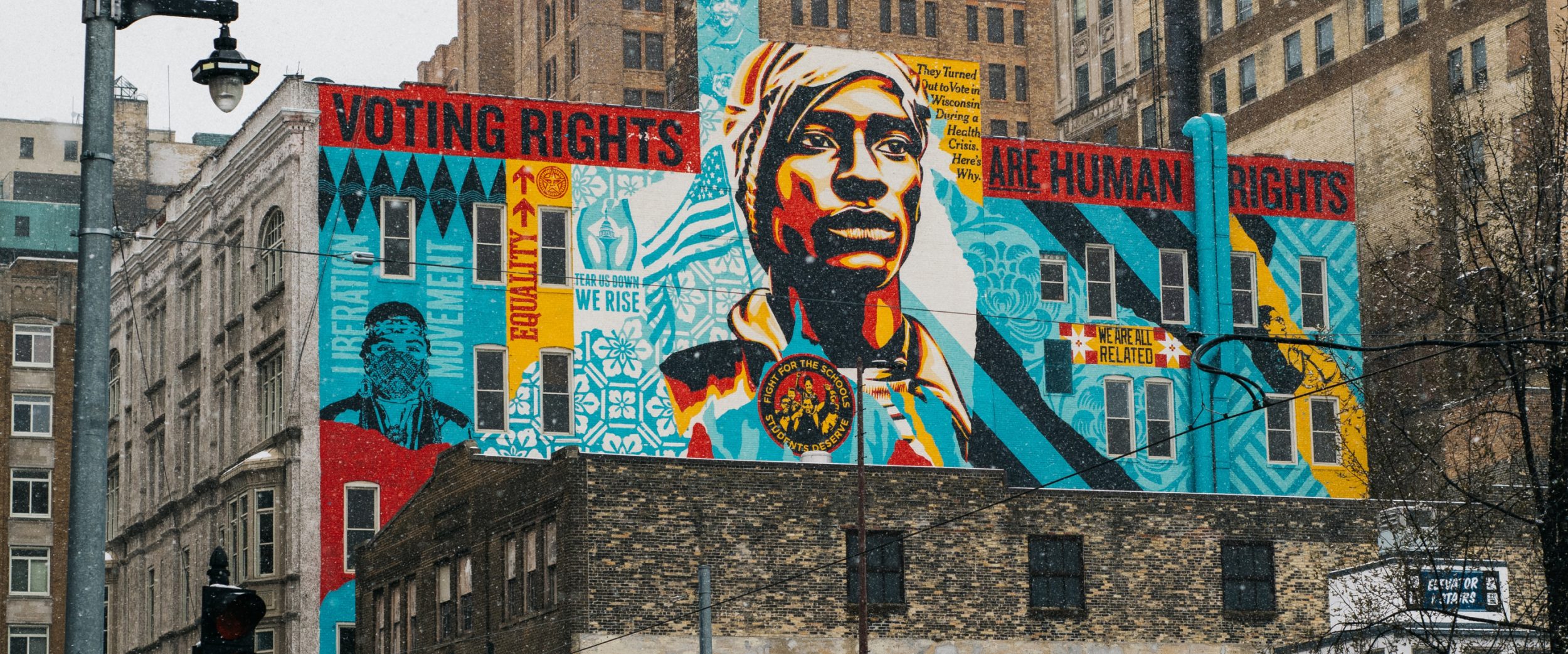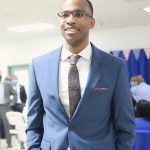On June 15, 2021, Joel Castón became the first incarcerated person ever elected to public office in Washington, D.C. He is currently incarcerated in the Correctional Treatment Facility, part of the complex of the D.C. Jail, and serves as the advisory neighborhood commissioner (ANC) representing District 7F07. On July 13, 2021, via Zoom, he shared with Inquest his trajectory, why he decided to run for office, and how having a voice in the political process is one way to end mass incarceration. This account, as told to Premal Dharia, has been edited and condensed for clarity.
I’ve been incarcerated since 1994. I have spent my 20s, my 30s, and the mid-part of my 40s behind prison bars. Today, I turned 45 years old and am now the newly elected commissioner of a single-member district, 7F07.
In this capacity as commissioner, my constituents consist of those residents inside the Central Treatment Facility and the Central Detention Facility, as well as the residents inside the Park Kennedy apartment complex in front of the institution, as well as women who are housed inside the Harriet Tubman Women’s Shelter. I am the liaison between my constituents and the government.
ANC representatives are the lower-level government in the District of Columbia. When anything is being done, particularly when measures are being considered by our D.C. councilmember, as ANC representatives, we have to see that document first. I have to access that information. I have an official email account. And through that email account I receive government documents about everything that’s happening not just in my single-member district, but also in the District of Columbia. That allows me to be informed. So when my opinion is being sought by policymakers, councilmembers, or the mayor, they first distribute that information to us. We get to weigh in on it, and whatever recommendations that we give, it must be given greater weight. That’s the power that we have as ANC commissioners.
This has been a seat that has been vacant since it was created in 2013. So I’m the first to occupy this seat. Hence the historical nature of my election. It was explained to me that many of my predecessors — former men and women who have since transitioned from the prison world to the free world — they had been clamoring for representation for this demographic. And I’d be the first to admit that if it wasn’t for them who had been advocating for restoring the vote, which allowed incarcerated people to get to vote while we are currently incarcerated, I would not have this seat.
So I’m actually standing on the shoulders of so many men and women who have made this city become a democracy for this marginalized group that I represent. The mayor of this city and the District of Columbia councilmembers had said, “No, wait a minute. We want all Washingtonians to have a voice. And we’re not just saying this with lip service. Let’s make this a law.” And they made it a law. And once that law was enacted the first thing I wanted to do was to go vote. Whenever we enfranchise the incarcerated population or someone who was once justice-involved, once that individual is fully enfranchised then they can obtain true citizenship. This is why I think that what the District of Columbia is doing is on the right side of history.
[I]n the press that has been dealing with me, there is a single narrative: ‘He’s a convicted felon.’ And that bias, that explicit bias sometimes can prevent someone from hearing what I have to say.
joel castón
In politics as a commissioner, one of the things I see here now is that this position gives me an official voice. But in the communities I come from, because of the systemic racism and barriers that have been in place, we have not traditionally participated in those arenas. And when we have participated in those arenas, when people of color tried to advance in economics, they have faced staunch opponents. When we tried to advance in politics — you think about Reconstruction, that was dismantled. There’s a distaste in the mouth of people from marginalized communities. What I’m discovering now in my particular tenure as ANC commissioner is that it has invigorated people who look like me, and people who come where I come from. We’re changing the narrative.
I wanted to change the narrative. If you have an incarcerated population who are functioning in the democratic process, my belief is that that same mindset will follow individuals once they transition back to society. We know the results we receive when we’re always doing the same thing. If we want something different, or get different results, we have to do something different. Enfranchisement of one of us proves that you can enfranchise all of us. Allowing one of us to have a seat proves that you can allow all of us to have a seat. We were once on the wrong side of things, now we’re on the right side of things. We were once a part of the problem, now we want to be a part of the solution. So I hope that my story can change that narrative. My voice matters. My vote matters. I was not appointed. I was elected. I have constituents who want me to represent them. And they wanted to be represented in a certain kind of way.
[M]any of my predecessors — former men and women who have since transitioned from the prison world to the free world — they had been clamoring for representation. . . .
Joel castón
On the work of ending mass incarceration, one of the things that my constituents are saying over and over again is, We don’t want our lives shaped by a single narrative. Even in the press that has been dealing with me, there is a single narrative: “He’s a convicted felon.” And that bias, that explicit bias sometimes can prevent someone from hearing what I have to say.
Sworn Into office

ANC Commissioner Joel Castón, sworn into office by Judge Milton C. Lee of the D.C. Superior Court. (Image: D.C. Department of Corrections.)
I’m a spiritual guy. I’m the first to admit I can’t do this alone. I definitely believe in divinity and divine power and Providence and all those high-powered concepts. And I just felt like I had to do this. It was the same sentiment I felt when I became a founding mentor of the Young Men Emerging community. I felt like, Here’s a demographic that I know so well. I know how it felt when I was 18 years old sentenced to a life term of imprisonment. No counseling — no one had spoken to me about that. I was sent to a maximum security penitentiary. It was very challenging. It was very threatening. A lot of things happened to me during that time and to others around me. So I know what it feels to be a young man in the world where you’re too small to defend yourself, and you really can’t think past go. So I felt it was my duty to mentor these young men. And that’s the same feeling I felt once I realized that my right to vote was restored. I felt it was my duty to run. It was my duty to make the advocacy I had been doing, unofficially, official.
Right after I got elected, my first call of duty was to have a meeting with the executive team here at the facility. And that was very moving. They all recognized me and congratulated me as being Commissioner Castón. So that was good to receive their support. And they began to ask me, “Hey, how can we help?” And I shared with them that I wanted to put together a survey. And so I just completed my survey, and I’m looking for the appropriate channels by which I may distribute my survey to the population I serve. I felt and I still believe that instead of me saying, “This is what Joel thinks needs to be done,” I need to hear from my constituents and them telling me what they would like to be done.
For our bigger community outside of the D.C. jail, I believe that unity is community. And what I’ve discovered from all the people who have visited the Young Men Emerging community, they speak of how they appreciate our brotherhood and how much they appreciate our sacred circle, when we sit down to have a conversation. They speak about how they feel welcome. They speak about how they feel the genuine love that we display one for another. I want to build upon that model in society as a whole. And for my constituents at the Park Kennedy apartments, I look forward to having community conversations with them — not just solely by hearing about issues at the place, but about how we can live harmoniously together as neighbors.
"Enfranchisement of one of us proves that you can enfranchise all of us."
I don’t think that I have the right answer or the silver bullet to how we end mass incarceration. I have been incarcerated longer than my lived experiences in society. Even though I’m celebrating my birthday and giving God the glory for allowing me to be a 45-year-old man, still in my mind it baffles me that I’ve spent 27 consecutive birthdays inside of the carceral state. Logically and naturally, it doesn’t really make sense. This is what mass incarceration looks like in real time.
But I would say that economics and politics — once we can merge those two, especially for people from disinvested and marginalized communities, we can begin to move towards ending mass incarceration. The community I come from has not been participating fully in those two broad-based fields. And we know why. We have historical data that speaks to why we haven’t been included. Black Wall Street — these were people who were martyred because they were prosperous. We have slavery. Convict-leasing, which many say was even worse than slavery. This type of stuff is systemic. And the only way we can deal with the system that has been systemically racist against people of color is by going against the system with its own rules. And that’s politics. If we can get involved in civic engagement matters and economic principles, then we can begin to move toward a more democratic society.
This is why I’m grateful to God to allow me to have this post. The more we have these first incarcerated officials elected to public office, the more people will begin to say, “We see an out.” And I think, collectively, we can solve the problem.
Image: Unsplash

